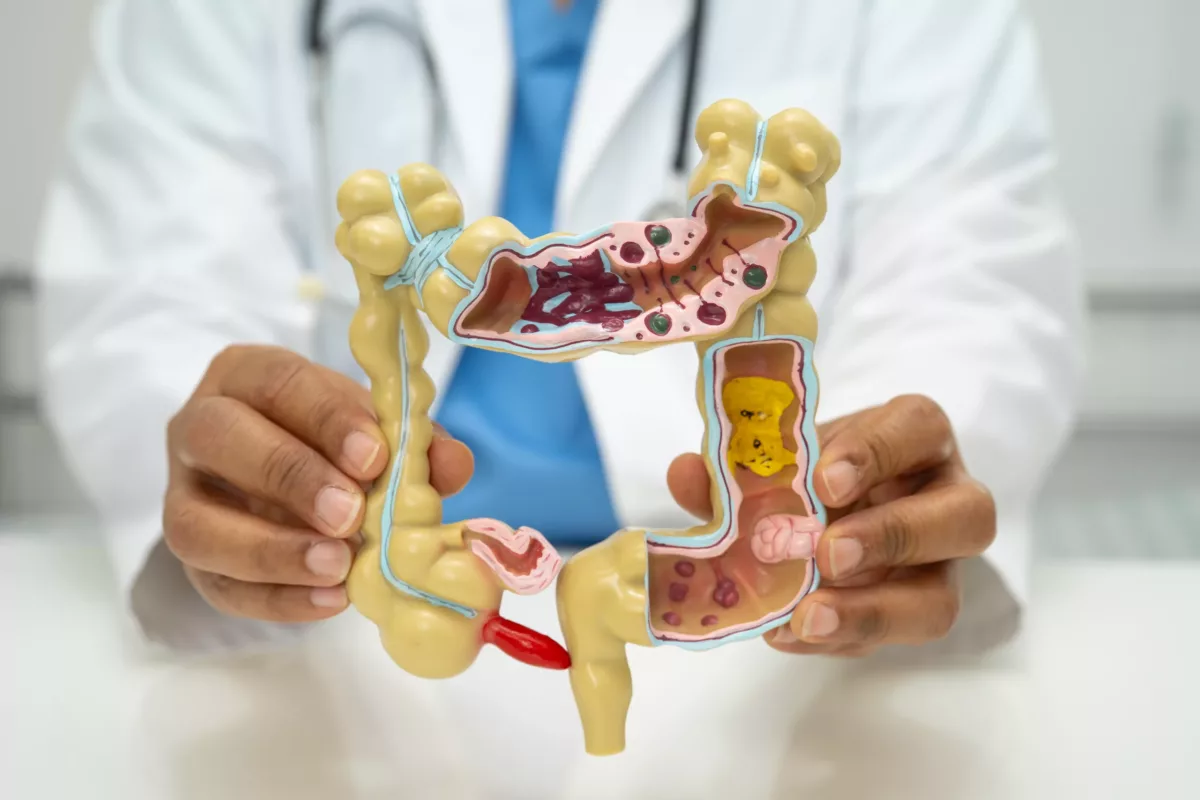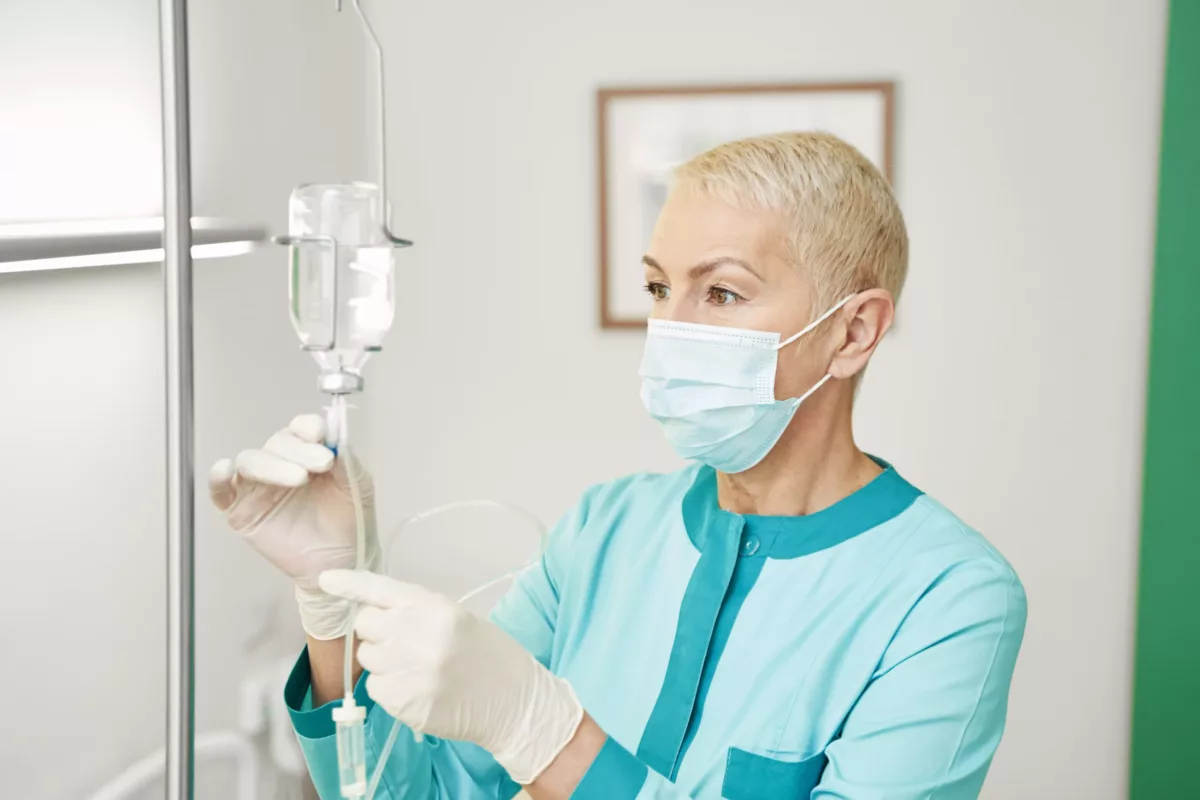The cancer that begins in the rectum cells is called rectal cancer. When cancer occurs inside the colon and rectum, it is called colorectal cancer. The end part of the colon is called the rectum. It begins at the end of the colon and ends at the anus (the short and narrow passage).
Rectal and colon cancers have multiple similarities, but treatment can be different. It happens because the rectum is separated from other body structures and organs. The surgery to remove rectal cancer usually is challenging because it sits in a tight space.
Treatment usually involves surgery, chemotherapy, radiation therapy, and others.
Symptoms
Like other cancers, this one does not cause symptoms in its early stages. However, when it advances you may experience the following ones. Examples include:
- Blood in the stool
- Narrow stool
- Unusual weight loss
- Weakness
- Extreme tiredness (fatigue)
- Abdominal pain
- Problems with bowel movements
- Bowel habit changes (such as constipation, frequent need to pass stool, diarrhea, and others)
See a doctor if any of the symptoms listed above happen.
Causes
Experts do not fully understand why it happens. However, it occurs when cells in the rectum develop DNA changes (mutations), which is similar to many cancer types. DNA of a cell contains instructions that tell it when to grow, multiply, and die. DNA changes give different instructions to cells that make them grow and multiply abnormally. Over time, when these abnormal cells become too much they form a mass (known as a tumor). This mass can invade and destroy healthy tissue. Without treatment, the tumor may break and spread throughout the body (metastasize).
The tumors may grow slowly or fast, but it depends on the cancer type you experience. Cancers that grow quickly and spread throughout the body are more aggressive and require immediate treatment. The only way to identify them before it is too late is regular checkups (it is advised at least once per year).
Risk Factors
While physicians do not know the exact cause of rectal cancer, they identified some factors that could elevate your risk of developing it. Check below some examples:
- History of colorectal cancer or polyps – The risk of this cancer type significantly increases if you have had it in the past. Moreover, adenomatous polyps also increase the risk.
- Race – Black people are more likely to develop colorectal cancer than other races.
- Diabetes – People with this chronic health condition are at increased risk of developing colorectal cancer.
- Alcohol – Heavy alcohol drinking also increases the risk of developing it.
- Dietary changes – If you have a diet low in vegetables, the risk of developing rectal cancer elevates.
- Family history of colorectal cancer – If you have a sibling or parent with this cancer, your risk of developing it increases significantly.
- Inflammatory bowel disease – Chronic diseases of the intestine and rectum (including Crohn’s disease and ulcerative colitis) also elevate your risk.
- Inherited syndromes – There are some DNA changes that often run in families that pass from biological parents to biological children and may increase your risk of developing colorectal cancer. These include Lynch syndrome, familial adenomatous polyposis (FAP), and others.
- Obesity – Excessive body weight also puts you at increased risk of getting this cancer.
- Age – While colorectal cancer may occur at any age, it mostly is diagnosed in people over 50 years old.
- Cancer treatments – If you follow a treatment with radiation therapy the risk of developing other cancers (including rectal cancer) significantly increases.
- Smoking is another risk factor for rectal cancer
- Being physically inactive – Lack of physical exercise also may elevate your risk of colorectal cancer.
What Are The Potential Complications of Rectal Cancer?
People with this cancer type may experience some complications. These include:
- Bleeding – This complication occurs commonly in people with this cancer type. In some cases, immediate treatment is required because bleeding is severe.
- Intestinal obstruction – When the tumor becomes too large, it may block the bowel, which prevents the stool from leaving the body. Commonly, surgery to remove the tumor relieves this complication. If surgery is not an option, discuss with your doctor about treatments to ease this problem.
- Intestinal perforation – This cancer type may cause damage to the intestine lining that may lead to perforation. Generally, this complication requires surgery.
How to Prevent Rectal Cancer?
Unfortunately, there are no sure ways to prevent colorectal cancer. However, you can consider the following tips to reduce the risk. For example:
- Quit smoking or never begin. If you face problems with smoking cessation, discuss it with your healthcare provider.
- Try to get and maintain a healthy weight
- Regular exercise (it is recommended to aim for at least 30 minutes of physical exercise per day)
- Dietary changes (you should reduce the amount of processed foods, red meat, and other unhealthy foods and add to your diet more fresh fruits, vegetables, nuts, and whole grains)
- Limit or avoid alcohol
- If you are at risk of developing colorectal cancer or are over 45 years old, it is advised to have regular appointments with your doctor to check for abnormalities linked with this cancer type.
Diagnosis
Physicians usually diagnose this cancer type by using the following tests, but first, they may perform a physical examination and ask some questions about your symptoms and medical history. Check some tests often involved in rectal cancer diagnosis below:
- Colonoscopy – It is used to look at the large intestine and rectum. To perform this test, doctors usually use a long and flexible tube with a lighted camera on the end (also called a colonoscope). It helps identify irregularities linked with colorectal cancer.
- Biopsy – During the previous test, doctors may get a small sample of the affected tissue and test it in the laboratory to check for cancer cells.
Once you are diagnosed with this cancer type, physicians will perform additional tests to determine the stage (extent) of the cancer. Check below some tests to check for rectal cancer spread:
- Complete blood count (CBC) – This test is used to check the levels of different cells in the blood. It may confirm anemia (low red blood cell count) that indicates blood loss caused by cancer.
- Other blood tests to check organ function
- Carcinoembryonic antigen
- Imaging tests such as MRI (magnetic resonance imaging), CT (computerized tomography), and ultrasound
Treatment
The treatment for people with rectal cancer is different because it depends on multiple factors. For example your age and preferences, the stage and location of the cancer, existing health problems, and others.
Surgery
Check below some procedures used to treat rectal cancer:
- Transanal local excision – This procedure is performed with a colonoscope. It is usually recommended for people with small cancers. When it grows large and negatively affects nearby tissues or lymph nodes, additional surgery is needed.
- The removal of a part of all of the rectum – If the tumor grows too large and it is far from the anus, surgeons will remove a part or all of the rectum. It is called low anterior resection. Moreover, this surgery preserves the anus. When the cancer negatively affects the upper part of the rectum, doctors recommend to remove it. In such cases, surgeons will perform colorectal anastomosis. In addition, the rectum is completely removed when the cancer appears in the lower rectum part. This procedure is called coloanal anastomosis.
- Abdominoperineal resection (APR) – When the tumor develops near the anus, usually is not possible to remove the cancer completely without causing damage to the muscles that control bowel movements. In such cases, surgeons will perform APR that involves the removal of the rectum, anus, and a colon part and nearby certain lymph nodes (sometimes).
Chemotherapy
This treatment involves strong medicines to kill cancer cells throughout the body. These medicines are usually recommended for people with advanced cancers. Sometimes, it may be used to shrink the tumor before surgery. Chemotherapy drugs usually are given to the patients intravenously (IV), but a pill form also is available.
Radiation Therapy
This treatment involves powerful energy beams directed to the cancer cells to destroy them. This energy usually comes from protons, X-rays, and other sources. For people with colon and rectal cancer is used radiation therapy type called external beam radiation. It involves a specific machinery that moves around you and delivers the radiation exactly to the tumor while you are lying down on a table.
Sometimes, physicians may recommend chemotherapy along with radiation therapy to kill cancer cells that may remain after surgery.
Targeted Therapy
This therapy also involves medicines that block certain proteins in the cancer cells, causing them to die. It is prescribed when other treatments do not work or for people with advanced-stage cancer. In some cases, physicians may prescribe chemotherapy along with targeted therapy to prevent the recurrence of the cancer or when surgery is not an option.
However, doctors may perform some tests on the cancer cells to determine whether target therapy is effective for you or not.
Immunotherapy
Generally, cancerous cells produce certain substances that help them hide from the immune system. Immunotherapy involves specific medicines that boost the immunity to fight against cancer cells. It also may be an effective treatment for rectal cancer when surgery is not an option or for people with metastatic cancer.
Frequently Asked Questions
What are the risk factors for rectal cancer?
While the exact cause of this cancer type is not known, physicians identified some factors that could elevate your risk of developing it. These include:
- Age – It is diagnosed mostly in older people.
- Polyps
- Family history of colon or rectal cancer
- Smoking
- Obesity
- Heavy alcohol drinking
- Inflammatory bowel diseases (including ulcerative colitis, Crohn’s disease, and others)
For more details, discuss it with your healthcare professional.
What are the most common symptoms noticed in people with rectal cancer?
- Unusual weight loss
- Extreme tiredness
- Weakness
- Abdominal (belly) pain
- Bowel habit changes (for example diarrhea, constipation, and others)
- Blood in the stool
If any of the previous symptoms occur, immediately contact your doctor.
What are the potential complications of rectal cancer?
People with this cancer type may experience some complications from the disease and treatments as well. For example:
- Intestinal obstruction
- Bleeding
- Infections
- Intestinal perforation
- Nerve damage
- Hernia
- Chronic diarrhea
- Sexual function problems
- Malnutrition
This document does not contain a full list of rectal cancer complications. Ask your healthcare provider if you have additional questions.




